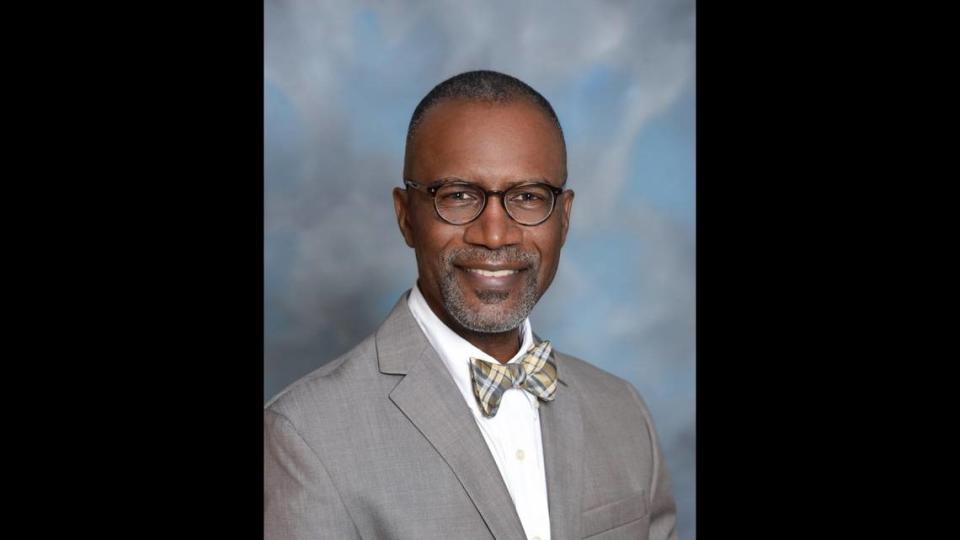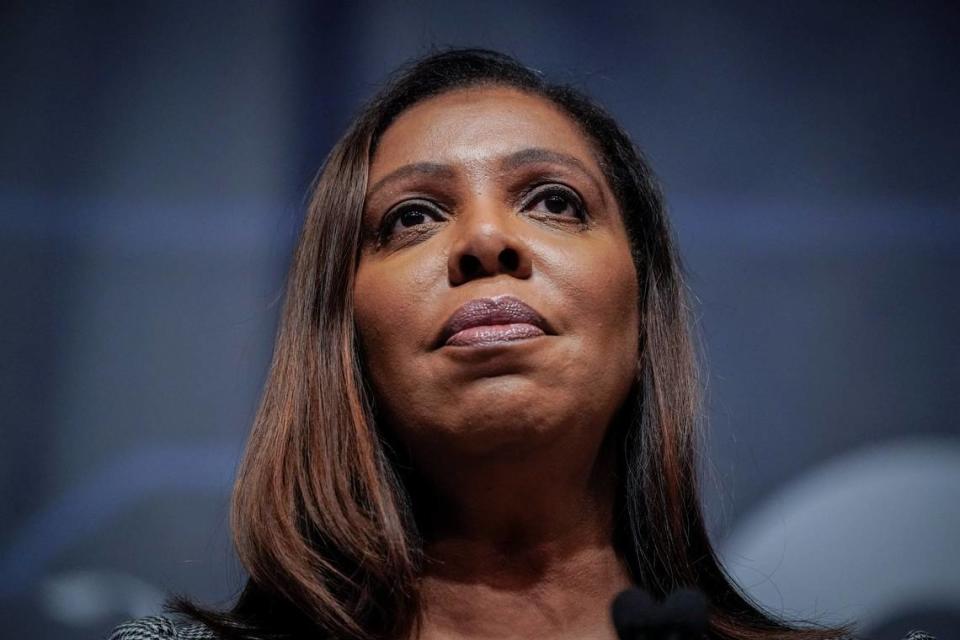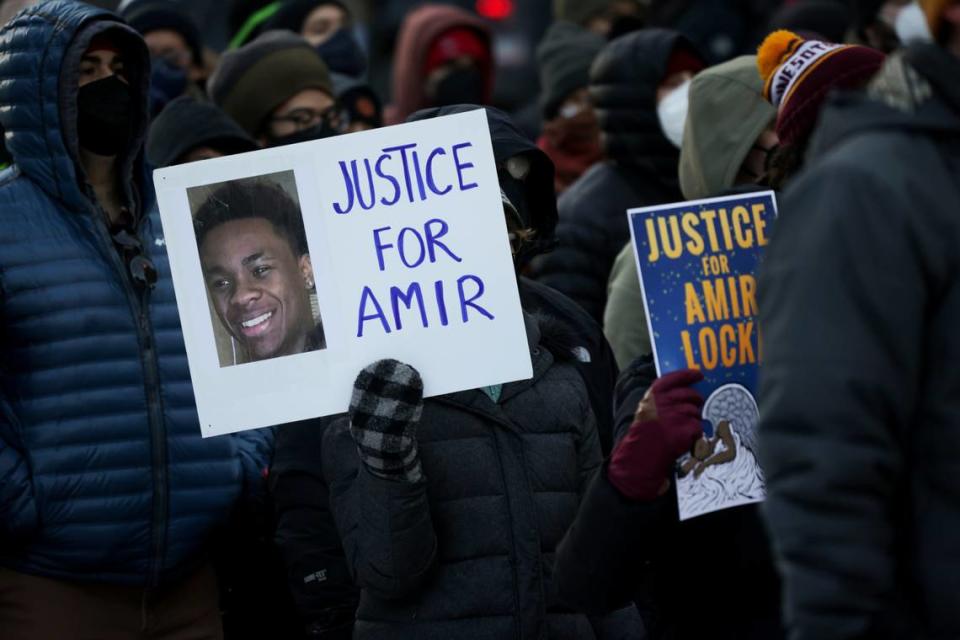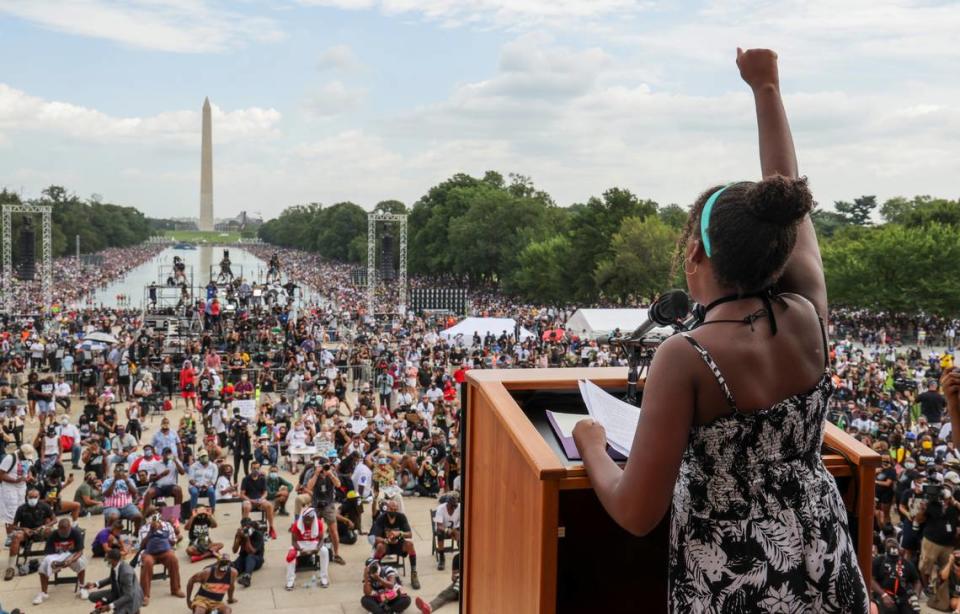The 44 Percent: Black firsts, Amir Locke & Gunna
- Oops!Something went wrong.Please try again later.
- Oops!Something went wrong.Please try again later.
With the Senate having just confirmed Ketanji Brown Jackson to the Supreme Court, I rounded up other notable firsts in Black American history along with the year it occurred:
President Barack Obama (first Black president – 2008)
Vice President Kamala Harris (first female, Black and Asian vice president – 2020)
Senator Hiram Revels (first Black U.S. senator – 1870)
Representative Joseph Rainey (first Black U.S. representative – 1870)
Rep. Shirley Chisholm (first Black congresswoman – 1969)
Justice Thurgood Marshall (first Black Supreme Court justice – 1967)
John Taylor (first Black man to win Olympic gold medal – 1908)
Alice Coachman (first Black woman to win Olympic gold medal – 1948)
Count Basie (first Black man to win a Grammy – 1959)
Ella Fitzgerald (first Black woman to win a Grammy – 1959)
Hattie McDaniel (first Black woman to win an Oscar – 1940)
Sidney Poitier (first Black man to win an Oscar – 1964)
Robert Johnson (first Black billionaire – 2001)

Without diving too deep into the numbers, it’s clear that Black Americans usually have to wait some time to gain entry into spaces that have been dominated by white folks. Moments like Obama’s inauguration or McDaniel’s Academy Award win (for a maid at that) just mean a little more for that reason. Now that Jackson is actually confirmed, don’t be surprised to see a few tears flow.
INSIDE THE 305

Michael Finney, who championed county’s economic growth, dies suddenly:
South Florida lost a “gift” in Michael Finney, the CEO of the Miami-Dade Beacon Council, who died Sunday at the age of 65.
“Mike Finney, although transplanted, lived Miami-Dade each and every day of his life, working to let the world know how great a community we are,” Eric Knowles, CEO of the Miami-Dade Chamber of Commerce, said. “A giant among men!”
Here are a few excerpts from Finney’s obituary that shed some light on what he meant to Miami-Dade County:
Since arriving in Miami from his native Michigan, where he served in a variety of economic development roles, Finney was credited with re-energizing the council and bolstering efforts to improve economic equity and inclusivity across Miami-Dade. His tenure coincided with the COVID-19 pandemic, which initially hit the county’s tourism- and service-oriented economy hard, as well as a subsequent influx of high-profile financial and tech companies.
On its website, the Miami-Dade Beacon Council says it “helped secure” business expansions in industries such as tech financing, cryptocurrency, financial services, healthcare innovation, aviation, and trade and logistics. From 2020 to 2021, the council claims credit for 32 projects that resulted in nearly 5,000 new jobs at an average salary of $120,000. That was a record for the organization, the council said in a news release announcing Finney’s death.
Finney also focused on connecting workers in low-income, high unemployment neighborhoods and communities with employers and jobs paying a living wage. The initiative, Miami Community Ventures, was modeled on a successful Michigan program.
OUTSIDE THE 305

Attorney generals cite “unacceptable and potentially unlawful” behavior in letter to NFL:
The NFL might have to answer unwanted questions in the near future.
Attorneys general from six states — Illinois, Massachusetts, Minnesota, Oregon, Washington and New York — threatened to investigate the NFL’s workplace culture, according to a letter obtained by The New York Times. Addressed to Commissioner Roger Goodell, the letter follows a February New York Times’ story that featured interviews with more than two dozen former employees who described “experiencing a demoralizing culture.”
The allegations included female staff members saying they had been forced to watch a video showing the former running back Ray Rice knocking unconscious his then-fiancée; being asked to publicly declare if they had been victims of domestic violence; and being marginalized or pushed out of their jobs if they questioned the NFL’s handling of sexual harassment issues.
“All of this is entirely unacceptable and potentially unlawful,” the attorneys general wrote in a letter, which was obtained by The Times, adding that they would use “the full weight of our authority to investigate and prosecute allegations of harassment, discrimination, or retaliation by employers throughout our states, including the National Football League.” The league headquarters are in Manhattan, and Letitia James, the New York attorney general, was among the signers.

Prosecutors decline to charge police in Amir Locke killing:
Police won’t face charges in the death of Amir Locke, a 22-year-old Black man killed by a SWAT officer while executing a no-knock warrant in February.
Hennepin County Attorney Michael Freeman and Minnesota Attorney General Keith Ellison said that there was “insufficient admissible evidence to file criminal charges in this case,” in a statement released Wednesday.
The statement said the state would be unable to disprove “beyond a reasonable doubt” elements of Minnesota’s use-of-deadly-force statute that would have authorized use of force by Mark Hanneman, the officer who shot Locke.
The attorneys also said the state would be unable to prove beyond a reasonable doubt a criminal charge against any other officer involved in the “decision-making that led to the death of Amir Locke.”
Locke was not a suspect in the case that led police to his home in February. His mother, Karen Wells, told reporters that she was “disgusted with the city of Minneapolis” after learning of the decision.
“Once again, Minneapolis, you’re showing your true colors of actually who you are and who you represent. I’m not going to give up,” she said at a news conference Wednesday afternoon.

A California task force recently approved a proposal that limited reparations to lineal descendants of slaves or Black Americans who survived slavery or arrived immediately afterwards.
The debate in California — and really America at large — over reparations hinged on two simple questions, according to Andscape’s Jesse Washington:
Are reparations for slavery, or racial injustice in general? What defines a person as a Black American?
At least 11 cities may need to answer that question in the near future.
HIGH CULTURE

Gunna is so fly that Rihanna dressed up as him for Halloween.
No, seriously — and she killed it.
As GQ’s Jewel Wicker writes, the Atlanta-raised MC is a transcendent talent known for more than his bars:
He is a rapper whose greatest talent might not even be rapping. He’s the kind of culture-setting, energy-dispersing celebrity who could exist only at this specific moment.
Look no further than how Gunna coined the phrase “P” with just a simple blue “P” emoji (if you still don’t know what “P” is, thank me later).
Where does “The 44 Percent” name come from? Click here to find out how Miami history influenced the newsletter’s title.

